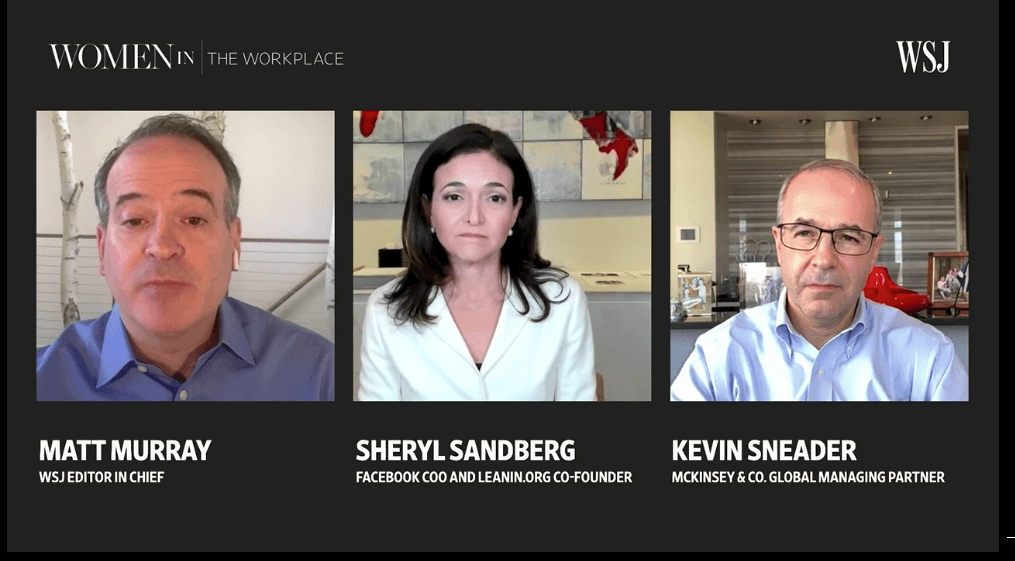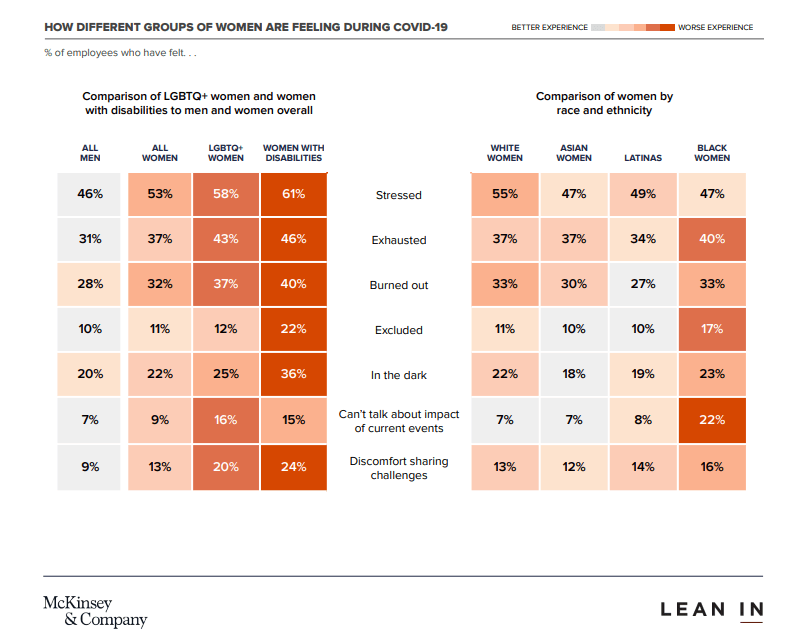Women in the Workplace is the largest comprehensive study of the state of women in corporate America. In 2015, McKinsey & Company and LeanIn.Org launched the study to help companies advance diversity in the workplace. Between 2015 and 2019, close to 600 companies took part in the study, and more than a quarter of a million people were surveyed on their workplace experiences.
Now, in 2020, women in corporate America are facing a new challenge: the Covid-19 pandemic. This year’s report focuses on how the pandemic has affected women at work, including the unique impact on women of different races and ethnicities, working mothers, women in senior leadership, and women with disabilities. It also looks at the emotional impact of incidents of racial violence in this country on employees. Finally, it tracks the changes we’ve seen in women’s representation over the past six years, and assesses how Covid-19 could disrupt those trends going forward.
Last week ALLY, and several other organizations including Women in Finance, Catalyst, Ivy, Latinariffic, and the Women's Center for Entrepreneurship participated in the Wall Street Journal Women in Series where McKinsey & Co. Global Managing Partner, Kevin Sneader, Sheryl Sandberg, Facebook COO and Leanin.org Co-founder and Matt Murray, ESJ Editor in Chief talked about the latest study.

Download a copy of the full narrative and read more.
Progression is slow but steady
At the beginning of 2020, before the Covid-19 pandemic began in the United States, the representation of women in corporate America was slowly trending in the right direction. This was most pronounced in senior management: Between 2015 and 2020, the share of women grew from 23 to 28 percent in SVP roles—and from 17 to 21 percent in the C-suite. Women remained dramatically underrepresented, particularly women of color, but the numbers were slowly improving.

The Covid-19 crisis could erase all the gains we’ve made
Due to challenges created by the Covid-19 crisis, as many as two million women are considering taking a leave of absence or leaving the workforce altogether. This is the first time we’ve seen signs of women leaving the workforce at higher rates than men; in the previous six years of this study, women and men left their companies at similar rates. If these women feel forced to leave the workforce, we’ll end up with far fewer women in leadership—and far fewer women on track to be future leaders. All the progress we’ve seen over the past six years would be erased.
Many employees are struggling during COVID-19
Mothers, senior-level women, and Black women are facing distinct challenges with a few key themes:
- Covid-19 could push many mothers out of the workforce
- Companies are at risk of losing women in leadership
- Black women are less likely to feel supported at work during Covid-19
- It’s important to understand that intersectionality impacts women’s experiences.

Signs women are downshifting their careers
The pressures of the pandemic are driving some employees—especially women—to consider downshifting their careers or leaving the workforce. The following factors are predictive of whether an employee considers downshifting or leaving:
- Lack of flexibility at work
- Feeling like they need to be available to work at all hours, i.e., “always on”
- Housework and caregiving burdens due to Covid-19
- Worry that their performance is being negatively judged because of caregiving responsibilities during the pandemic
- Discomfort sharing the challenges they are facing with teammates or managers
- Feeling blindsided by decisions that affect their day-to-day work
- Feeling unable to bring their whole self to work
- Although these factors hurt all employees, some groups of women experience certain challenges at higher rates. For example, mothers are more likely than fathers to worry that their performance is being negatively judged due to their caregiving responsibilities.
- Women in senior leadership are more likely than men at the same level to feel as though they are “always on.” And Black women are more likely than women and men overall to feel like they can’t bring their whole selves to work.
An opportunity in a crisis
The report further that if companies can rise to the challenges the Covid-19 crisis has put in high relief, we may be laying the foundation for a more flexible and empathetic workplace for everyone. You can read more and best practices for the workplace by downloading the full report here.




